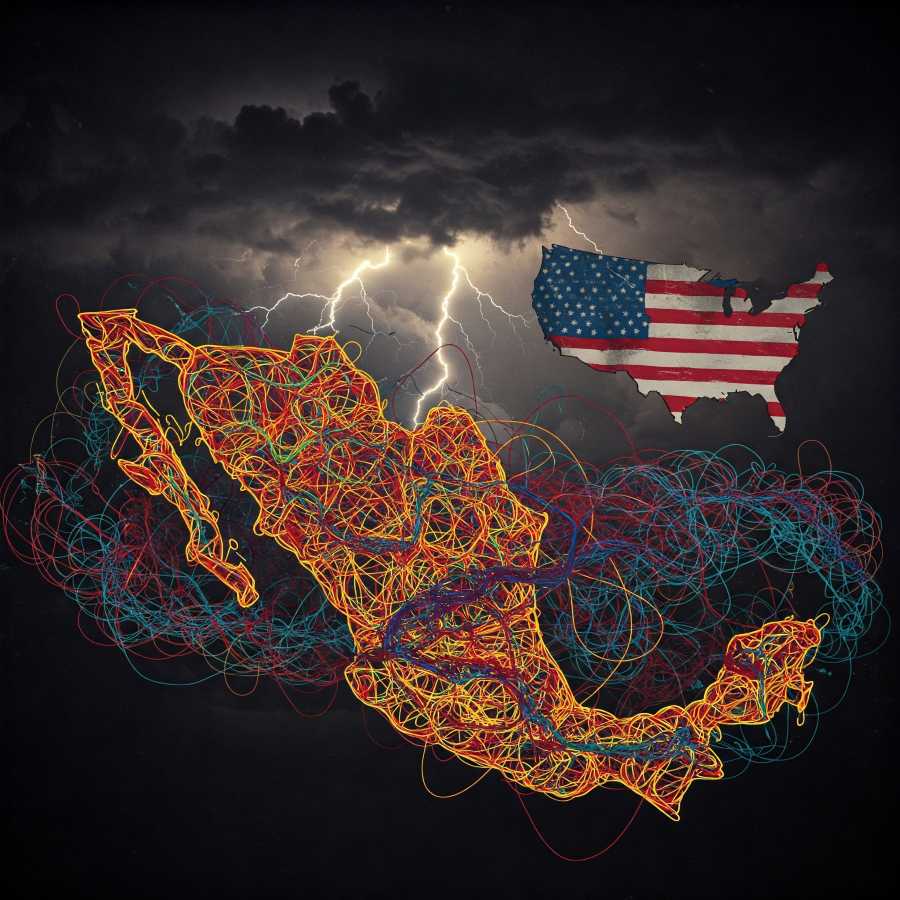Mexico Urged to Confront US Indifference on Regional Integration Amid Shifting Global Order
Academics warn Mexico must shed illusions and forge new strategy as Washington prioritizes domestic concerns and a potential return to ‘neo-imperialism’ looms.

Mexico must fundamentally reassess its approach to North American relations, starting from the stark reality that regional integration is not a priority for the United States, according to leading Mexican academics. This necessitates a clear-eyed strategy acknowledging a resurgence of US imperial tendencies and a dramatically altered global landscape marked by Sino-Russian alignment and fraying transatlantic ties.
"North American integration is not a priority for the US; Mexico's analysis, negotiation, and strategy on the issue must begin there," stated Héctor Arturo Oropeza García, a professor at the prestigious Institute of Legal Research (IIJ) at the National Autonomous University of Mexico (UNAM).
Speaking at a panel discussion titled "North America: The Challenges of its Integration," Prof Oropeza argued that the world is undergoing a period of profound disorder, paving the way for a new global structure. "The geopolitical construct of the Western idea no longer exists: the breakdown of the Europe-US alliance is evident," he asserted, adding that the rise of a potent Eurasian bloc, underscored by Russia's invasion of Ukraine as part of a "Sino-Russian union," confirms this shift.
This geopolitical realignment coincides, analysts warned, with a return to great power politics and overt assertions of national interest, challenging the post-Cold War consensus. Diego Valadés Ríos, an emeritus researcher at the IIJ, cautioned that the empires many believed consigned to history have merely evolved. "Mexico, Latin America, and the rest of the world must accept the return of US imperialism," he declared, warning of a new era defined by "wars" across multiple domains: territorial, manufacturing, digital, and cultural.
Mexico's Economic Straitjacket
Central to Mexico's predicament is its persistent economic vulnerability, rooted in decades of policy choices. Prof Oropeza lamented that Mexico remains stuck as a "maquiladora and assembler," having relinquished ambitions for higher-value industrial development akin to East Asia, particularly China. "We must ask ourselves why we are in this state of weakness when negotiating with our northern neighbor," he probed, highlighting Mexico's limited leverage. "Why is our room for maneuver so narrow and we cannot 'respond' with tariffs?"
The answer, he suggested, lies in Mexico's deep economic entanglement with the US. Approximately 80 per cent of Mexican exports are destined for the US market, and crucially, a majority "are not ours," but rather belong to transnational corporations operating within Mexico.
The implementation of the North American Free Trade Agreement (NAFTA) in 1994, replaced by the US-Mexico-Canada Agreement (USMCA), accelerated the decline of domestic industry, Prof Oropeza argued. "We made the big mistake of believing that we could move forward with the maquila industry... We were wrong to think it was a strategic comprehensive development project, which it hasn't been and can't be."
This path was underpinned by an influential, if ultimately damaging, aphorism: "that the best industrial policy is one that doesn't exist." Mexico largely adhered to this, Prof Oropeza noted, leading to the current situation. While acknowledging recent government proposals like "Plan Mexico" aimed at reviving industrial focus, he stressed the primary challenge remains psychological: "The first challenge is to break the myths we have lived by."
US Strategy Questioned
Compounding Mexico's challenges are shifts within US economic strategy. Claudia Schatan, an economist, researcher, and consultant, pointed to America's persistent "triple deficit" – budget, trade, and external debt – as a source of US fatigue with existing global arrangements. She questioned the efficacy of protectionist measures, exemplified by former President Donald Trump's tariff policies, in resolving these deep-seated imbalances or achieving genuine reindustrialisation. "Will [he] be able to overcome these major economic imbalances by entrenching himself behind the 'almost medieval' walls he is building?" she asked, pondering whether the world is witnessing a US-driven deglobalization and potential "deregionalization" of North America.
Prof Oropeza characterised current US efforts to reclaim manufacturing leadership as fighting yesterday's battle. "That 'war' was in the 20th century and China won it," he stated bluntly. While the US retains potential leadership in the crucial digital sphere, its fixation on past industrial glory risks undermining the North American economic project itself. "The foolishness of returning to being the leader it was and probably can never be again calls into question the day-to-day life of the North American economic project," he emphasised.
Fractured Region, Conflictive Rhetoric
The lack of genuine regional cohesion further complicates the picture. Carlos Humberto Reyes Díaz, also a scholar at the IIJ, described North America as caught "between the insignificance and obsolescence of a region that began in 1994 with relative dynamism but never consolidated." It has always been, he argued, a collection of three individual countries rather than a truly integrated bloc acting jointly on the world stage.
This fragmentation is reflected in the prevailing discourse. "The language is torn between incorporation and isolationism," Mr Reyes Díaz observed. Concepts like negotiation, regional integration, and international law are being supplanted by talk of protectionism, national sovereignty, and non-intervention used divisively. Concerns over production chains and nearshoring are overshadowed by threats of tariff wars and calls for American companies to reshore operations from Mexico. "This is not language that seeks concord, but rather poses a tremendously conflictive scenario for the upcoming renegotiation of the USMCA," he warned.
Mr Valadés added that current international negotiations are marked by "very 'peculiar' ways," often characterised by unilateral conditions dictated by dominant economic powers, seemingly sidelining principles of reason that underpin constitutional states, as noted by fellow academic Guillermo Floris Margadant.
Navigating Neo-Imperialism
The potential return of Donald Trump to the US presidency looms large over these discussions. Isidro Morales Moreno, from the Benemérita Universidad Autónoma de Puebla, depicted such a scenario as ushering in a period of "neo-imperialism," citing proposals like reclaiming the Panama Canal or annexing Greenland, alongside actions that trample international law and institutions like the World Trade Organization.
Faced with such pressures, Mexico's strategy cannot rely on displays of force, Prof Morales Moreno argued. Instead, it requires careful diplomacy and strategic positioning. Mexico must articulate a defence strategy via a "diplomatic shield" and fundamentally rethink its desired relationship with the US. "We cannot change geography," he stated, "and we must decide whether we want to be 'simply neighbors' or 'strategic neighbors'."
Depressurising the relationship, he concluded, necessitates "working closely" with diverse sectors and business groups within the United States itself – a complex task requiring Mexico to shed old assumptions and navigate a turbulent new era of global power politics and assertive US nationalism. The challenge for Mexico City is to forge a path that protects its interests in a North America increasingly shaped by forces beyond its control.




